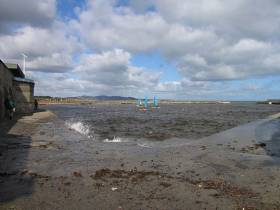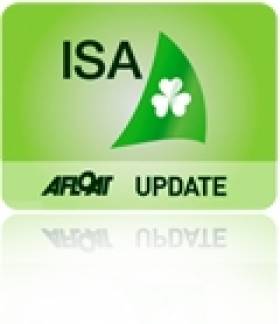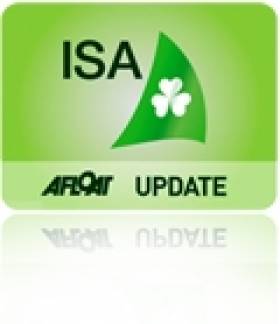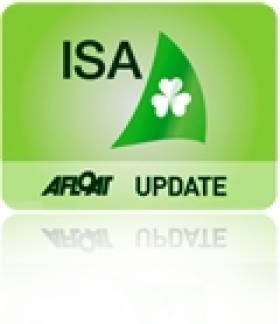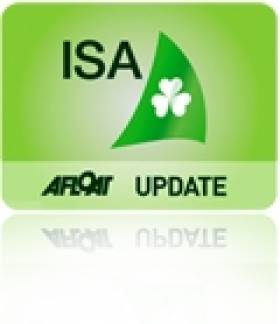Displaying items by tag: strategic plan
#BrayHarbour - Bray Harbour has lagged behind its more illustrious Co Wicklow neighbours, from Wicklow Sailing Club and its annual Round Ireland Race to neighbouring Greystones and its successful new marina.
A build-up of silt in the harbour similar to that plaguing Howth boaters hasn't helped matters.
But moves are being made to boost Wicklow's closest harbour to the capital, from the water to the quayside, as the Wicklow Times reports this week even though some Bray locals think real work in the harbour still lies over the horizon.
Speaking at the launch of Bray Sailing Club's 2016 summer season, Wicklow County Council cathaoirleach Cllr John Ryan promised to work with the OPW to implement a lasting solution to the silt deposits as part of a new strategic plan for the harbour but Bray Sailing club Commodore Mark Henderson says they are still a 'long way from seeing anything happen to improve the situation'.
'The tragedy is that we have a vibrant and growing sailing club with over 300 members in a prime location beside a harbour which is rapidly becoming unusable' Henderson told Afloat.ie
'Many moorings are now severely restricted in their use due to increased silting, while others are untenable in even moderate weather conditions because of breaking waves. This has led to many club members moving their boats elsewhere, and frequent launching difficulties for our (dry sailed) Flying Fifteen fleet, says Henderson.
'We as a club, along with other organisations representing approximately 800 to 900 harbour users, are working hard to have something done before the harbour becomes totally unusable but to date we are frustrated that we are able to report little progress' he says.
He also backed investment to support upgrades already made in the harbour area, such as the refurbishment of the Harbour Bar and the new Dockyard restaurant.
Imminent improvements include the opening of a new walkway along the Dargle River in the North Co Wicklow town.
#sailingplan– Changes have been made to the Irish Sailing Association (ISA) Strategic Plan 2015 – 2020 that is to be proposed for adoption at the 2015 AGM in a fortnight. The revision includes the edits made to the original draft to reflect the input from the briefing meetings in Dublin, Cork and Galway. The latest version (downloadable below as PDF file) also takes onboard some of the observations contained in Afloat's original review of the document in January.
The main changes are:
• The inclusion of an additional pillar titled 'Representation'. This has been done to reflect the importance of this function for ISA members, who look to the Association to make sure that their concerns and aspirations for Sailing are effectively conveyed to decision makers of all types, whether they be at central or local government level, involved in regulation or in a position to support Sailing and increase the level of participation in Ireland.
• The use of the term 'Sailing' in place of 'sport' or 'sport of sailing' in all strategies except those specifically to do with competition. It was pointed out by a number of people that 'sport' implies competition and only covers a limited section of the range of activities that make up 'Sailing'. The remit of the ISA extends to all of the activities that 'Sailing' encompasses and that term has been adopted as being more appropriate.
Apart from the changes flowing from the addition of the 'Representation' pillar, various minor edits have been made throughout the document to correct errors in the consultation draft and state the strategies more clearly. However, none fundamentally changes the direction previously outlined for the Association between now and 2020, as set out in The Way Forward document, and the thrust of the new focus for the Association in providing a better and more relevant service to our clubs and members.
The minor changes include a redesign of the 'Overview' pages (04 and 05) to more clearly express the content, the inclusion of specific reference in the 'High Performance' pillar to Paralympic involvement (previously included in the global 'Olympic' term) and an expansion of the strategies listed for the 'Efficient Management' and 'Communication and Sponsorship' areas.
Sailors Can Take Lead In Encouraging Growth Of Sport Says Lee
#ISA - Wicklow's Norman Lee has "very positive" feelings for the new course plotted for Irish sailing in the ISA's new strategic plan.
But the dinghy sailor echoes Afloat blogger Magheramore's comments earlier today that lasting change in the sailing scene requires real commitment from our clubs and classes.
Speaking to Afloat.ie, Lee says that "unless boat owners and other people involved in sailing actively encourage and facilitate newcomers to participate, he reorganisation will not achieve much."
Yet while Magheramore believes sailing clubs can take charge of this by changing to a 'pay for play' model whereby members would sail a club-owned fleet, potentially opening access to sailing as a sport and pastime wider than ever, Lee sees it as "one of our problems" that "too many stand back and expect the ISA or the clubs to fix things."
He suggests that sailors themselves in general could be more welcoming to newcomers, taking them out on the water "to experience the things they need to experience to get hooked."
He adds: "Most claim they are too busy or their boat isn’t suitable or they would lose points, all these selfish Tiger excuses need to be dropped if members are serious about reversing the flow and growing the sport."
Lee is also outspoken about the need for changes in club junior training, such as reducing the number of modules to save on time and costs "when all most people want is the basics so that they can safely helm or crew".
He feels strongly "that one or two seasons learning the basics should be followed immediately by channelling into normal club racing/activities. The certificate chase should only be for a few who are keen to instruct and have shown reasonable sailing ability and genuine interest in the sport."
In terms of development, Lee believes it is "good to shift the focus onto regional development officers (RDOs) getting to know the grassroots, but the job is too big for two or even three.
"Four might be okay, but only if their range of duties and job spec is kept very tight and practical. At present it seems impossible."
Overall, however, Lee maintains that the "huge work" put in over the last two years in charting a new direction for Irish sailing has been an "uplifting experience and, if it continues in the way proposed, will turn Irish sailing around and be the prototype for similar change needed in other jurisdictions."
The ISA May Have Changed; Do Our Clubs & Classes Want To Change?
#isastrategicplan – Afloat's occasional blogger 'Magerhamore' listened to the recent presentation of the ISA Strategic Plan and question and answer session in Dun Laoghaire last Wednesday and the following thoughts have come to mind:
The ISA seems to have radically transformed it's attitude. The Strategic Plan sets out clear strategies for developing sailing. However, at the centre of these strategies is a clear mission for the ISA to assist and support Sailing Clubs, Sailing Classes and Training Centres. The ISA may have changed; do our clubs and classes want to change? If they do, then things will happen. If they do not then nothing will change.
The present club model is largely based on offering a service to a relatively small number of boat owners, their families and their crew (many of who may not be members of the club). Many potential sailors (and their parents) have neither the intention or the finance to purchase a boat. Furthermore, present training schemes do not necessarily teach the skills needed to maintain and improve a boat.
If sailing is to tap in to the large potential market for sailing then clubs will have to change model, and develop 'pay for play' type activities. It is important to emphasise that this 'pay for play' should not be limited to beginners. There are many pathways into competition at the very highest level for those who do not own their own boats, including team racing and match racing. Worldwide, many events are based on charter fleets and many class championships are dominated by club owned boats.
The skills to operate such schemes exist in Ireland... but not necessarily in the clubs. Many training centres own and operate large fleets of boats. That expertise needs to be transferred to the clubs.
The long term development of year round activities - training, coaching, running 'pay for play' requires a radical transformation of the training and employment of instructors and especially senior instructors. If clubs are to develop new activities then they need full time, permanently employed staff with the management skills to run a sailing base. There are many Irish sailors with the required experience and skills.Very few of them work in Ireland.
Sailing needs to be ambitious. We are an island nation with a similar population to New Zealand. We have an incredible playground, our lakes and coastal waters, on our doorsteps. Sailing should be one of Ireland's biggest participant sports. Our ambition,should be that in a few years there are more active participants in sailing (a sport for life) than in Gaelic Football, Soccer or Rugby. This will not happen without a complete transformation of the way we manage and develop our sport.
A potential future Irish Ben Ainslie may be living in Tallaght, Tullamore or Termonfeckin. He or she will probably never set foot on a boat, or never enter a sailing club. Without parents willing to spend considerable sums he or she will never attain their potential. Surely our role is to allow all of those who want to mess about in boats the opportunity to do so.
READ MORE FROM MAGHERAMORE? How clubs can cash in on sailing's spectator appeal; The 'Great Dinghy Sailing Debate' Means Questions for ISA & Yacht Clubs; Is 'Adventure Sailing' a New Tack for Dinghy Sailors?
Irish Sailing's New Strategic Plan Charts 2020 Course
#isa – Two years after a heave against the Irish Sailing Association (ISA) a new five year strategic plan has been published writes David O'Brien in this morning's Irish Times sailing column HERE.
The Plan is for the period 2015 - 2020 and is based on the views that were put to a 'Strategic Review Group'. The SRG was asked by the Board in 2013 to assess where the Association stood and how it needed to adjust to better serve the sport of Sailing. The Board accepted its Report and tasked a group to prepare a new Strategic Plan for the ISA based on its contents.
This blueprint (downoad the draft plan below as a 2mb pdf file) looks like a positive step forward not least because it makes an attempt to implement measurable targets for the good of grass–roots sailors. That rule was something lacking on a now scrapped 2020 vision document sub–titled 'grow the sport, grow the membership, grow the organisation'. This discredited plan turned out to be boom time folly and like so many other projects around the country at that time, poorly thought out and only half–built.
On foot of it, in 2013 a band of dissenting sailors held the ISA to account for its lack of performance. Back then, association efforts were more focussed on getting the ISA genie back in the bottle than the sport back on track. In a push for change at the National Yacht Club (NYC) in April 2013, the embattled body heard over 300 suggestions for change.
Not least was the fact sailing had lost a quarter of its members in recession and key yacht clubs are still in choppy financial waters. A massive fall off of junior sailors also presented an inconvenient truth that problems lay not with the children but with the paucity of guidance for newcomers.
Sailors like Norman Lee and Bryan Armstrong were joined by former president Roger Bannon (now its Treasurer) in calling for fundamental reform.
'The ISA has lost its way over the last few years," Bannon wrote in March 2013, giving his view of a bureaucracy 'detached from the reality of what is going on in the front line'.
Around the same time, County Wicklow dinghy sailor Lee said he wanted 'the ISA focus off elite sailing and the emphasis instead to be on enjoying sailing for fun as per the association's own articles of association'.
Two years on, an independent group of sailors has charted a new course but does this revised game plan satisfy these demands? Will it be a boost for clubs and classes, particularly smaller ones, or is the only comfort for them the fact that the process took place?
The underlying principle of the Plan is moving from a 'governance approach' to one of the principal stakeholders in the Sport working together with goal of encouraging and developing participation. The Association, Clubs, Training Centres, Classes and associated groups working in union to achieve those objectives underlies all of the strategies. There will be a renewed emphasis on utilising the input of volunteers to harness the skills and knowledge of active sailors so that the ISA can evolve and develop and respond to issues that arise.
The approach is in a logically presented format but there is very little that suggests the ISA will support ageing, less popular class associations, preferring rather to put faith in the bricks and mortar of clubs and training centres to strengthen access and participation avenues for current and potential sailors.
While many of the strategies are laudable, there will be difficulties in operating them, particularly where they are dependent on the vigour, enthusiasm and skills of volunteers at club level.
Indeed, there may be some instances where ISA aspirations are in direct conflict with local trends and activities. For example, what will the Optimist and Laser classes say to the strategy of 'encouraging participation of younger sailors in two person boats' or the dinghy classes about the strategy of encouraging crewing in keelboats.
The scenario will create debate about the professional structure required to deliver on its aspirations particularly in the training area. Suitably qualified personnel are necessary to negotiate the tricky waters disturbed by the demands of the multiple agencies with a stake in the sport and its delivery – HSA, Department of Transport, Department of Education.
At the same time it would appear that the working plan appears to validate the ISA's High Performance department as many of the strategies suggested are actually currently operational.
There are a number of curious omissions:
·No mention of Paralympic sailing in the High Performance section
·No mention of Youth Worlds, a fertile ground for ISA recently
·No mention of financing the association, strangely in light of the discussion around its joint membership scheme.
Where does the balance lies when gauging the benefit of an organisation producing a strategic plan – is it the outcome or the process that is the more valuable exercise? Or worse still, is it the creation of a stick to be beaten with further down the road if targets are not achieved.
The ISA has been fortunate in being able to rely on some excellent volunteer directors for the overhaul process. The combination of effectiveness and commitment of the new board has brought the association a long way in a short time but how sustainable is this voluntary effort over time?
One doer maybe better than forty talkers but effective volunteers are hard to find. Finding an ISA President a year ago was not without difficulty in itself. In the absence of such voluntary effort, and with the benefit of experience, can the professional staff see this new plan through or is more help needed?
As a draft, this document will no doubt undergo some change in the process that now follows. And while there have been some changes at the ISA's Park Road HQ, the evolution of the ISA from the Ursula Maguire administered one-person organisation of 20 years ago continues with a relatively minor correction of the set and drift that had crept in in recent years. Are more changes still to come? Will there be a replacement for the recently departed training director? Perhaps too someone is also needed to support the club racing side – maybe in conjunction with the Irish Cruiser Racing Association (ICRA)?
The appointment of Regional Development Officers to assist Clubs and Training Centres has been seen as one of the ISA success stories in recent years and it is proposed to increase their availability to Clubs and Training Centres. The Board has already decided to add a further RDO to the two existing appointments to ensure the local availability of expertise and advice and facilitate greater co-operation and coordination between local Clubs and with Training Centres.
The primary role of the Clubs in growing the sport locally, attracting newcomers and maintaining the interest of both existing and new members is acknowledged. Better linkages between Clubs and Training Centres for their mutual benefit are proposed. This is in the knowledge that most newcomers interested in taking up Sailing feel more comfortable in approaching a Training Centre than a Club but the long term involvement of sailors in the sport is best ensured by them joining Clubs, participating in Club activities and enjoying the benefits - both practical and social - that membership provides.
The over elaborate structure of ISA training courses and the difficulties of qualifying, retaining and upskilling instructors was a widespread complaint when the Review Group conducted their research. Strategies to resolve those problems are proposed.
An often expressed view about the Club Training schemes for Junior sailors is the amount of effort committed to running courses by Clubs and the relatively poor transfer rate from the courses to Club involvement and activity afloat. It is planned to refocus the training courses away from a 'certificate chase' to an emphasis on developing the skills learned. An online sailing passport scheme to supplement the paper based certificate system is proposed. It will be trialled in the coming season and will allow the recording of both course attendance and other time afloat, whether racing or leisure sailing.
A strategy of encouraging the training of young sailors in two person boats, as opposed to single handed craft, is proposed, with a view to improving both their technical and social skills. A renewed emphasis on sailing being a sport for life and avoidance of the risk of sailor burnout by compressing skills acquisition into young sailors' early teens, are envisaged.
The redressing of the perceived imbalance between the support structures for those competing in the non-Olympic area and those involved with the High Performance area - essentially the Olympic arena - is proposed. This will not affect the support for the High Performance sector, which is funded through the good offices of the Irish Sports Council, but will instead propose that the support available to other areas of competition will be enhanced. Better access for Clubs and Classes to coaching at local level is one of the principal strategies envisaged and it is hoped that Clubs and Classes will be able to access both coaches with a High Performance background and those with experience of specific Classes.
It is proposed that the ISA should re-commence the co-ordination of a racing event calendar to facilitate the avoidance of clashes between events and re-establish the balance between local, regional and national events.
Now the process of re-evaluation has begun, the ISA is urging all sailors to play a role to win back participation in sailing. A green light from clubs and classes is key to this plan's success.
The following regional meetings are taking place:
Wed 21 Jan 15 7pm-9pm Dublin, Royal St George Yacht Club
Tue 17 Feb 15 7pm-9pm Cork, Rochestown Park Hotel
Tue 24 Feb 15 7pm-9pm Galway, Galway Bay Sailing Club
'Independent Group' of Sailors to Form Future Irish Sailing Association Plan
#ISAPLAN – The Irish Sailing Association (ISA) is set for a shake–up following a year of controversy over its policies. Last night it was revealed an 'independent group' – that includes some of the association's critics – has been appointed to form a new plan for the governing body.
In framing the terms of reference for the 'Strategic Review Group' (SRG), ISA President Niamh McCutcheon conceded 'events have overtaken it and the ISA needs a new plan'.
A team of six leading sailors will 'establish the policies to be pursued and the actions required to deliver them successfully', according to SRG chairman Brian Craig, a former flag officer of the Royal St George Yacht Club in Dun Laoghaire.
Some long standing grievances aired last winter led to revolt when sailors Norman Lee and Bryan Armstrong criticised its dinghy and small boat training at the ISA agm. The points raised received widespread support that manifested itself months later in a vocal 'dinghy conference' for Ireland's 20 small boat classes at the National Yacht Club, resulting in over 300 suggestions for change.
It took perseverance and genuine courage to press for this change and there will be many sceptics and spoiling interests to confront if this first step is to translate into a new blueprint for sailing but in forming the new group, Craig has stressed its impartiality: 'As an independent group, we are ideally placed to seek suggestions".
We want to hear from anyone with a view to offer and I assure you that we will listen', he vowed.
Headquartered in Dun Laoghaire, the ISA has a staff of 14. Its accounts for 2012 show a turnover of €2m, much of it made up of government grants.
Significantly, Craig has included former ISA President Roger Bannon, an outspoken critic of current ISA policies in the line–up. A dinghy and sportsboat champion in his own right, Bannon used his term in office two decades ago to secure the position and financial viability of the association as a national sporting authority by making every member of a sailing club in Ireland also a member of the ISA.
It was a bravo move that unified Ireland's sailing clubs into a stronger whole fit to nurture the talent necessary to challenge the world at the top levels of sailing. But in more recent times that fitness has been called into question, and Bannon is among those who hit out at an authority that has arguably lost its relevance to all bar those at the most elite levels in the sport.
In a call for change on Afloat.ie last March, "The ISA has lost its way over the last few years," Bannon said, giving his view of a bureaucracy "detached from the reality of what is going on in the front line".
Craig has also asked another former president Neil Murphy, along with Olympic race officer Jack Roy, sailmaker Des McWilliam and small boat advocate Bryan Armstrong to join this Group, with the option to add others as the process continues.
Once it has carried out an 'initial examination' the group will move on to recommend 'future strategies'.
Spring 2014 is scheduled as completion date for the Group's assessment of the current position.
'This will be a major undertaking but I am confident that, with the support and engagement of all interested parties, we will chart a course for the Sport suited to this new environment.
It is understood the process will include a zero based budget review on key financial areas along with a review of the association's committee structures.
'The new plan will be critical to the association's ability to provide leadership in satisfying the aspirations of existing members and in attracting new participants to the sport', according to McCutcheon, the outgoing president due to step down in March.
The SRG has set up a dedicated email address and can be contacted by email through [email protected]
In a statement seen by Afloat.ie SRG Members are listed with the following bios as:
Bryan Armstrong lives at Rosses Point County Sligo. Keen if not overly successful dinghy sailor since the late 1960s with an interest in home boatbuilding in wood – Mirrors, GP14 and (for the 2011 Worlds in Sligo), a Fireball.
Committee member of Sligo Yacht Club several times over the years and Commodore 1978. Chaired organising group for 2006 GP14 Worlds in Sligo which was intrinsically linked with the construction of the new Sligo clubhouse. Always interested in junior sailing in Sligo and nationally. Committee member Irish Mirror Class Association 2004 to 2011 and President 2008 to 2010. Currently actively sailing a GP14. Practicing partner solicitor in a Sligo based firm. Bryan can be contacted at [email protected]
Roger Bannon, a member of the National Yacht Club, was President of the Irish Sailing Association when the Joint membership Scheme was established and the current Olympic /Elite model was devised in the mid 90's. He has always been a keen small boat sailor and has won multiple national titles in the 420, Mermaid, Flying Fifteen and J24 classes. He was the first Irish sailor to pioneer racing in the Olympic Star Class and more recently was one of the innovators in the establishment of the SB20 fleet in Ireland. He continues to have an active interest in the sport and still regularly sails his venerable 53 year old Mermaid "Endeavour" and when creaking bones allow, occasionally a J70 or a National 18. Roger can be contacted at [email protected]
Brian Craig, a former flag officer of the Royal St George, a member of the Irish Cruising Club, Lough Derg and Kinsale yacht clubs. Was a keen dinghy sailor competing on the Firefly, Fireball and Team Racing national and international circuits. Currently racing a SOD, he has a motor cruiser on Lough Derg and a cruising yacht based in Dun Laoghaire.
Since retiring from business, he has played a key role in attracting and organising major championships on Dublin Bay. He worked closely with the waterfront clubs and local bodies in Dun Laoghaire to develop the biennial Volvo Dun Laoghaire Regatta and more recently led the Irish team that ran the ISAF Youth Worlds 2012.
He was a recipient of the 2010 National Award to Volunteers in Irish Sport from the Irish Sports Council. Brian can be contacted at [email protected]
Des McWilliam (Royal Cork Yacht Club and Royal Irish Yacht Club)
A regular participant in Irish and international sailing. He is in constant contact with customers in dinghy and keelboat sailing - racing and cruising.
Des Sailed for Ireland: Admiral's Cup on five occasions, Sardinia Cup twice, the Southern Cross and 1/2 Ton Cup twice. He is the owner of McWilliam Sailmakers Ltd / UK Sailmakers Ireland and President of 50-loft UK Sailmakers International Group 2010-12. Co-owner UK Sailmakers International Group 2012-present and was a member of the Oireachtas Task Force on Small Business in mid '90's He was a guest lecturer in Entrepreneurship UCC late '90's and is still in business after five years of recession. Des can be contacted at [email protected]
Neil Murphy (Howth Yacht Club and Malahide Yacht Club)
Enterprise dinghies and Laser frostbiting (when wet suits were a novelty) were Neil's intro to the sport. Small boats are still his favourites and he races a Puppeteer 22 in Howth. As a National Race Officer, he gets to see and enjoy racing in a variety of Classes.
As one of the ISA's youngest Presidents (1996 to 1998), he launched its first Strategic Plan, which plotted priorities and set out its targets coming into the current millennium. He chaired the 2012 ISA review of the All Ireland (formerly Helmsmans) Championship and, most recently, was Race Officer when Howth YC hosted the 2013 event. Apart from racing, his main area of interest is in increasing participation levels, both by recruiting newcomers and retaining those already involved.
Neil can be contacted at [email protected]
Jack Roy (National Yacht Club, Royal Irish Yacht Club and Kinsale Yacht Club)
Started sailing Mirrors in 1967 from Greystones Sailing Club. Over the years he has raced in 420s, 470s, Flying Fifteens, J24s, Dragons, J109s and Squibs. He has also cruised for many years and currently keeps a cruising boat in Kinsale from where he sails the southwest coast and further afield. When Jack's not sailing he's very involved in race management and has been an International Race Officer since 1998. He was honoured to be the first Irish Race Officer at an Olympic Regatta in the London 2012 Games. Jack Roy is a cuurent board member of the ISA.
When not on the water, he is Managing Director of Fagerhult Irl Ltd, the Dublin office of a Swedish PLC specialising in energy efficient lighting solutions to the commercial sector
Jack can be contacted at [email protected]
For further reading:


























